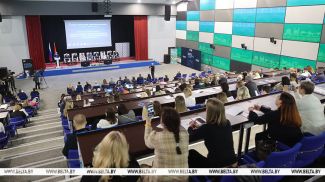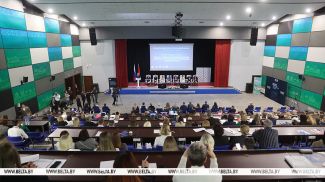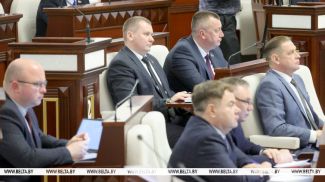The European Union stands ready to discuss any rapid or more long-term systemic efforts to help Belarus weather the storm sparked by the coronavirus pandemic, Head of the EU Delegation to Belarus Dirk Schuebel said in an interview with BelTA. He also spoke about the EU assistance to the Eastern Partnership countries in connection with the COVID-19 outbreak and the prospects for the ratification of the Belarus-EU visa facilitation and readmission agreements amid the current difficult situation.
- The EU has decided to support the Eastern Partnership countries in connection with the COVID-19 outbreak. Would you please explain how and to what extent this relates to Belarus?
- Needless to say, COVID-19 is a global threat. The EU is doing a lot to mitigate the impact of the coronavirus outbreak on human lives and livelihoods. We are responding both to the immediate needs of the health systems and to longer term needs of the most vulnerable groups in society and small and medium-sized enterprises, which are the backbone of the economies. I want to point out that the EU is maximizing support to research into diagnostics, vaccination and treatment options. We are working to ensure that the supply of medicine and medical equipment is uninterrupted. Through increased production we are developing joint approaches to testing strategies in order to curb the spread of COVID-19 while ensuring that the healthcare systems can help all patients who require attention.
As part of its global response to the coronavirus outbreak, the European Union has reallocated €140 million for the most immediate needs of the Eastern Partnership countries, including in Belarus. The EU will assist with the supply of medical devices and protective equipment, including ventilators, masks, goggles, gowns, and safety suits. The EU is working with the World Health Organization (WHO) and is deploying €30 million to ensure that these necessary supplies are jointly purchased and effectively distributed among the health systems of the six partner countries in the coming weeks.
If required, the WHO will assist the Belarusian Health Ministry in training and awareness raising among the wider public, including with the help of resources from the ongoing BELMED program of the EU.
Similarly, using the EU resources, the United Nations Development Program and the United Nations Population Fund stand ready to support the Belarusian Labor and Social Protection Ministry in social protection and service delivery for vulnerable groups.
The ongoing EU-funded projects with participation of the Belarusian Red Cross are also looking to re-dedicate resources and personnel to help stop the spread of COVID-19 among the elderly in Belarus.
- In your view, how will today's difficult coronavirus situation affect the trade and economic relations between the EU and Belarus?
- While the EU is putting in place unprecedented support measures for its own economy, it is abundantly clear that the outbreak of COVID-19 will have serious economic consequences for all countries. A large part of the EU's COVID-19 response package is an effort to mitigate the impact on the real economy. Some resources from the trust fund of the European Union and the World Bank will be re-directed to the existing credit line with the Development Bank of the Republic of Belarus.
A new regional support program of €100 million will make it easier for SMEs to access credit. It will also simplify the administration of €200 million worth of existing credit lines and grants to SMEs, including through its EU4Business initiative.
I want to stress that Belarus has also been in contact with the European Investment Bank about adjusting and increasing its credit portfolio.
- At present, 30-day restrictions on travel to the Schengen area are in place. Will the restrictions be extended?
- On 17 March, the EU Leaders agreed to temporarily restrict non-essential travel from third countries into the EU for 30 days. Any possible adjustment or extension of the restrictions will be agreed in due time depending on how the COVID-19 situation will develop and on the strategies to fight the pandemic the EU member states will agree to pursue.
- What are the prospects for the ratification of the Belarus-EU visa facilitation and readmission agreements? When might they come into force?
- The precise date of their entry into force depends on the schedule of upcoming meetings of the European Parliament and the Council, which is uncertain in the current pandemic situation. We are at the final stages of the ratification procedure. The European Parliament is to give its consent before the Council can adopt its decision on the conclusion of the agreements and notify the Belarusian side.
The agreements will enter into force on the first day of the second month following the exchange of the respective ratification notifications.
- Many consulate of the EU member states in Belarus are closed. When will they be able to resume operation?
- Unfortunately, we cannot forecast when the appropriate administrations of the EU member states might consider it possible to resume their work. It depends on how the COVID-19 situation will develop.
The EU has recommended that whenever possible and despite temporary partial closure of visa sections, the consulates of the EU member states should remain open to process visa applications from family members of EU citizens; healthcare professionals, healthcare researches, and elderly care professionals; transport personnel and frontier workers, humanitarian aid workers, as well as passengers in transit through the Schengen area and passengers traveling due to pressing family issues.










